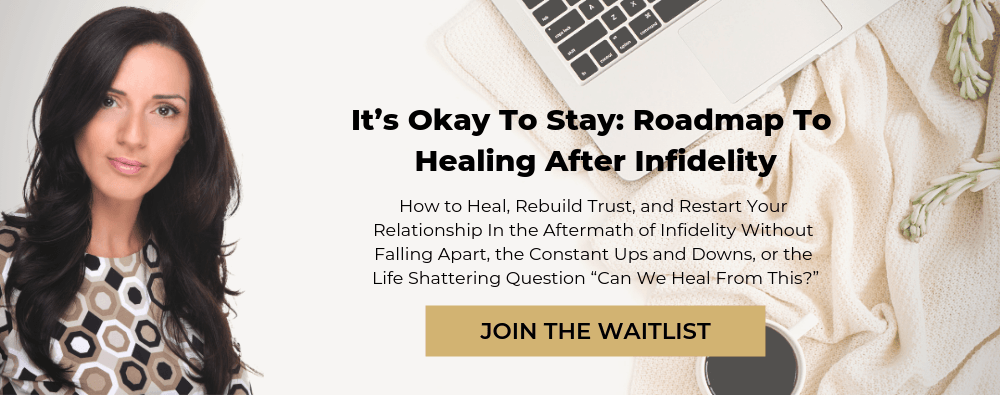Have you ever thought about who’s going to heal your pain after infidelity?
Are you a hurt partner seeking therapy to get over your pain?
Please keep reading.
- You will learn who can really help hurt partners heal infidelity pain.
- You’ll discover who probably doesn’t have the power to help.
- And I’ll outline what you can do if you’re stuck or feel unable to move past the pain.
Not long ago, I was contacted by a hurting spouse. His partner had been unfaithful and he requested individual therapy to help him overcome the pain. Nothing unusual about that.
Then he said something that soon spurred a mission for me and is the primary reason for this blog post. Curious to know what he said?
He said he was having trouble “surrendering to the healing process.”
Now, where did he get the idea that he needed to do such a thing and that he was doing it wrong?
He got this idea from his couples therapist! The very same one he and his wife (the unfaithful partner) were seeing together. Their therapist had promised to help them both “navigate the process in the most positive way.” Sadly, this therapist assessed this hurting spouse and made the suggestion that he go off to see an individual therapist alone. Why? Because he was implicated as the problem partner– too stuck and in pain to “surrender” to healing.
Unfortunately, this happens all too often and too many betrayed spouses suffer additional hurt needlessly. Therefore, this experience deserves some direct attention and clarity. Please read on.
Red Flags: When Your Therapist Suggests you Seek Help Separate from Your Spouse
First, as a couples therapist specializing in infidelity recovery, I see two key red flags in this scenario.
Let’s start with the idea of “navigating the process in the most positive way.”
Dealing with infidelity is a messy process. You and your partner will have to get in the dirt, experience it, understand it, and then find your way out. Together.
The couples I work with are warned that the process is not pretty. I definitely don’t ask my couples to “navigate it in the most positive way possible.” That’s like asking them to hide, bury, or closet their mess. Pretending to be something you’re not will only make matters messier and untrustworthy for a longer period of time.
The other part of that hurting partner’s story I found even worse?
The therapist’s second piece of advice regarding “surrender.”
Imagine sitting there, hurting, and then advised to go off to another stranger to figure out how you could feel less pain and become more open for the sake of your partner and the therapist’s “healing process.” In essence, the expectation is for you to get over it and make the whole business less messy.
It’s like expecting some emotional magic to happen. How unfair! In such pain, can you really be expected to find the one who has the right spell?
Think about it, do you ask yourself why you just can’t seem to forgive and forget quick enough for your therapist or partner? If so, I wouldn’t be surprised. Too often, hurt partners become trapped in the belief that there must be something wrong with them.
After all, when blame seems to come from the one person you intentionally sought out to help you, the insecurity and confusion deepen.
What message is your therapist sending you? What message is your therapist sending to you both as a couple?
When your couples therapist says, “Go get more help on your own,” it’s as if your very own relationship expert is deeming you a lost cause. This can be further devastating to you like kicking you when you’re already down.
And what about your relationship dynamics? How do you make any progress as a couple, if you believe that you’re the problem partner? How can you envision a future if you’ve been informed that you’re too stuck and hurt to be gracious, forgiving, or loving enough to move on with your partner?
Clearly, in the aftermath of infidelity, sending partners off to seek individual help do either partner much good. Let look at this more closely.
3 Reasons Why “Get Over the Pain & Surrender to the Process” is So Problematic
1. Because Trust Does Not Come Easy after Infidelity
To trust a therapist, your partner, or anyone in this world, is an act of bravery. After infidelity, many couples feel so unsafe that they disconnect from friends or family. So, actually, trusting a third person, a stranger, with the details of your relationship is courageous.
It takes a lot to offer trust and to earn it. It takes even more strength to do so after betrayal. So, why, when you’re faced with this relationship crisis, emotional pain, and inability to become vulnerable, should your therapist make further demands? Why make your struggles seem like unreasonable problems? To send you anywhere, wounded and alone, to fix your problems outside the couples session is incorrect guidance.
Instead, your therapist would be wiser and more helpful to
- tell you that your pain makes perfect sense!
- ask you what you need to heal.
- determine what is missing in the therapeutic process so they can help you feel better.
2. Because It Assumes the Pain after Infidelity is Yours to Resolve
Too many people, including therapists, view healing in unhelpful ways. Particularly unhelpful is the assumption that pain after infidelity is individual. Thus, convincing you- the hurting individual – that you are capable of fixing that pain on your own.
This thinking is a result of popular, mixed up thinking about forgiveness. If you ask most people, they will say you need to find forgiveness within yourself and explain how great it feels to let it go. That forgiveness is good for you so you should “just do it.”
Unfortunately, recovering from the pain of infidelity is not something you “just do” like powering through a workout.
In my online course, It’s OK To Stay, I teach about expressing remorse and forgiveness. Essentially, I want you to understand this:
Forgiveness is not a thing you give to your partner.
It’s a journey you BOTH go on. A journey that your partner needs to earn. It is impossible to forgive if the other side has not earned forgiveness.
Is this where you are stuck?
Consider this thought from Dr. Janis Abrahms Spring, author of How Can I Forgive You?:
“When the offender demonstrates that he understands and is sincerely disturbed by the harm he has caused you, and when he works to make repairs, you may be more motivated to release your resentment and invite him back into your life.”
So, what is the heart of my problem with your couples therapist sending you to heal with me or another therapist alone? Your therapist is actually sending you towards failure and more self-blame.
If you feel stuck and unable to move past your pain, you are not being unreasonable. In reality, you just need to deeply seek your partner’s help on your forgiveness journey… day after day after day.
This the answer to the question “Who’s going to heal your pain?”
THE ONLY PERSON WHO CAN HELP A HURT PARTNER HEAL IS THEIR UNFAITHFUL SPOUSE. No one else. They are the one who has the power to help you regain trust and forgiveness. Their remorse and commitment to do what it takes to regain a loving and trusting relationship are what you need to move forward together.
3. Because Not Being Ready to Forgive isn’t the Same as Being “Unable to Surrender”
Why must you surrender to the healing process? Is this war? Are you the enemy that needs to surrender? Does being unable to surrender to the process mean you are perpetuating bad feelings or are unusually hard-hearted?
Of course not! It is not your job to surrender or accept blame after your trust was shattered by infidelity. In fact, it’s unreasonable for anyone to judge you for being unable to forgive on demand. Or to heal per your therapist’s or partner’s timing. It just doesn’t make sense to expect you to trust a process enough to surrender to it when life and love as you used to know have been betrayed.
So, the point is this:
- Understand that it’s up to your betraying partner to be there for you. Not for you to surrender to them or the process.
- Your betraying partner should make sure you are supported into trusting them more and more fully.
You don’t need to surrender or trust them 100 %. It doesn’t make sense in your life right now. Just start with 5% trust and let your partner earn each trust percentage until you get to your comfort zone. Even if your new comfort zone is just 70 or 80%, that’s perfectly fine.
Finally, Dear Readers, Please Keep These Things in Mind
- If you’re the hurting partner, stop feeling bad about not being able to forgive quick enough for someone else. If someone sends you to fix your pain by yourself -tell them it’s impossible. Your pain healing process has a direct connection to your partner’s ability to help you heal. Ask them to help you by guiding your partner on how to help you heal and earn your trust and forgiveness instead of labeling you as the “difficult one.”
- If you’re the betraying partner, I hope you understand something essential about the healing process and about forgiveness in general: if you want your partner to get over the pain from infidelity. You need to understand you’re the main character in this healing. Also, ask your couples therapist to help you find ways to ease your partner’s pain. Don’t allow a therapist to dismiss your hurt partner by sending them off to figure it out by themselves. This will not help your relationship.
- If you’re a therapist helping couples in the aftermath of infidelity, I hope this gives you another look at how to help both partners, especially when it gets challenging.
Therapy is Not a Body Shop for a Problematic Spouse
Finally, you don’t need to be fixed. This is not how therapy works. This is not how life works.
Instead, here are some options for more productive, reliable support after infidelity:
- My FB group called: Idit’s It’s Okay to Stay Facebook group
- Other podcast episodes in Relationships Uncomplicated – some include free downloadable guides
- My online course: It’s Okay to Stay – Idit’s Online Course Waitlist
This Episode is Brought to you by:
This episode is sponsored by It’s OKay to Stay: Roadmap to healing after infidelity. My online course for couples who desperately need a clear roadmap with steps, exercises, and valuable content to help them heal and regain trust.
If you find yourself unable to get out of the crisis and you need a step by step program that moves you from crisis to gaining a loving and trusting relationship with your spouse, this is the course for you. Get all the information and updates about registration opening, and get an invitation to a FREE MASTERCLASS. iditsharoni.com/masterclass
—
Ultimately, I want to thank you for reading and considering this blog. I hope that what I’ve shared opens your mind to the healing process as a joint mission rather than one partner’s job. For more support, encouragement, and information, please visit my Affair Counseling page or contact me for a consultation soon. Please consider joining my online course waitlist for It’s Okay To Stay: Roadmap To Healing After Infidelity E-Course.
Heading

